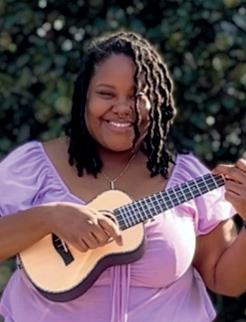
2 minute read
YOUTH ACADEMY THE EDUCATION M C
Ckenzie Oleman Makes Her Mark In Music Education
Interview by Ashley Johnson Lam
Now is when women are moving from a story’s subject to compelling creators both onstage and in the lives of others. Opera Carolina Youth Academy Chorus Director McKenzie Coleman is paving the way for young female students in the classroom and rehearsals. With excellent guidance from her later teachers, McKenzie found her way to college and a career as a music teacher at Park Road Montessori. Coleman also sings at Myers Park Baptist Church, Vox, Caritas, Women’s Chorus of Charlotte, One Voice Chorus, and most recently on stage with Opera Carolina in Porgy and Bess. Here’s how she’s making possibilities in music for herself and her students.
Q: What are some examples of success in the school district and classroom for modern-day women and their students?
A: Being visible is how I feel most successful. Kids who look like me have never seen a person like me in a leadership position in any capacity. Even here at my school – which I adore - the number of black teachers is disproportionately low. For some students, to see that someone like them can be a leader, even within this context, is monumental. And then, when I share the music-making outside of the classroom, it inspires them because they see that they can do music and something else. Music education is a female-dominated career path, but on the musician side, it’s male-dominated. So, it’s interesting for students to see both the familiar role of a teacher and music leadership. I intentionally present to my students that leadership at many levels is possible for modern-day women. I love teaching at the elementary level because they’re learning everything, and everything is a foundation of “I can do that” or “this is a possibility.”
Q: As someone who is an active musician and music educator, what unique benefits do music education and practice offer women at different stages of life?


A: Music helps us overcome stereotypes, for example, women who play instruments associated with men (like guitar). And our inherent nurturing nature matches the discipline it takes to be a musician, especially if you’re working with other musicians and students. Artists can be hard on themselves as they learn and grow; having that sort of care as a music educator can be beneficial.
Q: We are so fortunate to have you as our Academy Chorus Director. How do you see the Academy Chorus influencing our young female students?
A: For these young girls to see a woman of color as a conductor in a male-dominated industry is immeasurable. As they grow in their musicianship, it might happen less and less, but they’ll always have that background experience to know that other avenues of leadership can be valuable. For our group, which is the most diverse group of students I’ve ever worked with, it is priceless for them to have the experience of a black woman leading them
Q: As a Music Educator, what do you want to instill in your students that might help them in the future?
A: I tell them all the time that improvement is always the goal, not perfection. And we work on that skill through our activity. The desire and drive to improve and how it feels to actually improve is what I want to instill. We work on identifying the problem first and then setting a course to improve on it. The good ol’ musicianship values: discipline, practice, all of it. It’s all true, and I think it’s all about approaching them with that perspective. I believe genuine care is the way to go so it becomes a set of lifelong skills.









